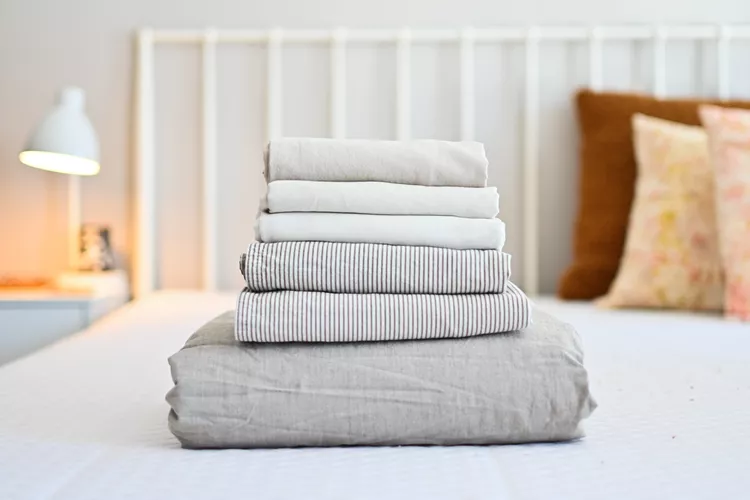Bed sheets could be as important as the mattress when it comes to getting high-quality sleep, and one of the most crucial aspects that you need to consider when you’re choosing a bed sheet is the material of the sheets, as many materials on the market include many features that suit the different needs and budgets of different sleepers.
The Importance of Choosing The Right Bed Sheet Materials
- Temperature Regulation: Your bed sheet should be constructed from a breathable and temperature-regulating material that promotes airflow and prevents overheating.
- Softness and Feel: When a material is soft to the touch and smooth on the skin, it can help lessen the irritation on sensitive skin and enhance the quality of your sleep.
- Allergy and Asthma Relief: If you’re prone to allergies, then you need to make sure that your bed sheet material is hypoallergenic and doesn’t harbor any dust or other irritants that could trigger your allergy.
- Moisture Control: Hot sleepers who frequently perspire at night will most likely want a bed sheet with moisture-wicking properties so that the moisture won't disturb their sleep.
- Lifespan and Maintenance: Several factors could affect the lifespan of your bed, and maintenance is one of the most crucial aspects that you need to do to extend your bed sheet lifespan, so make sure that your bed sheet material is easy to clean and maintain.
Bed Sheet Materials Compared
Cotton
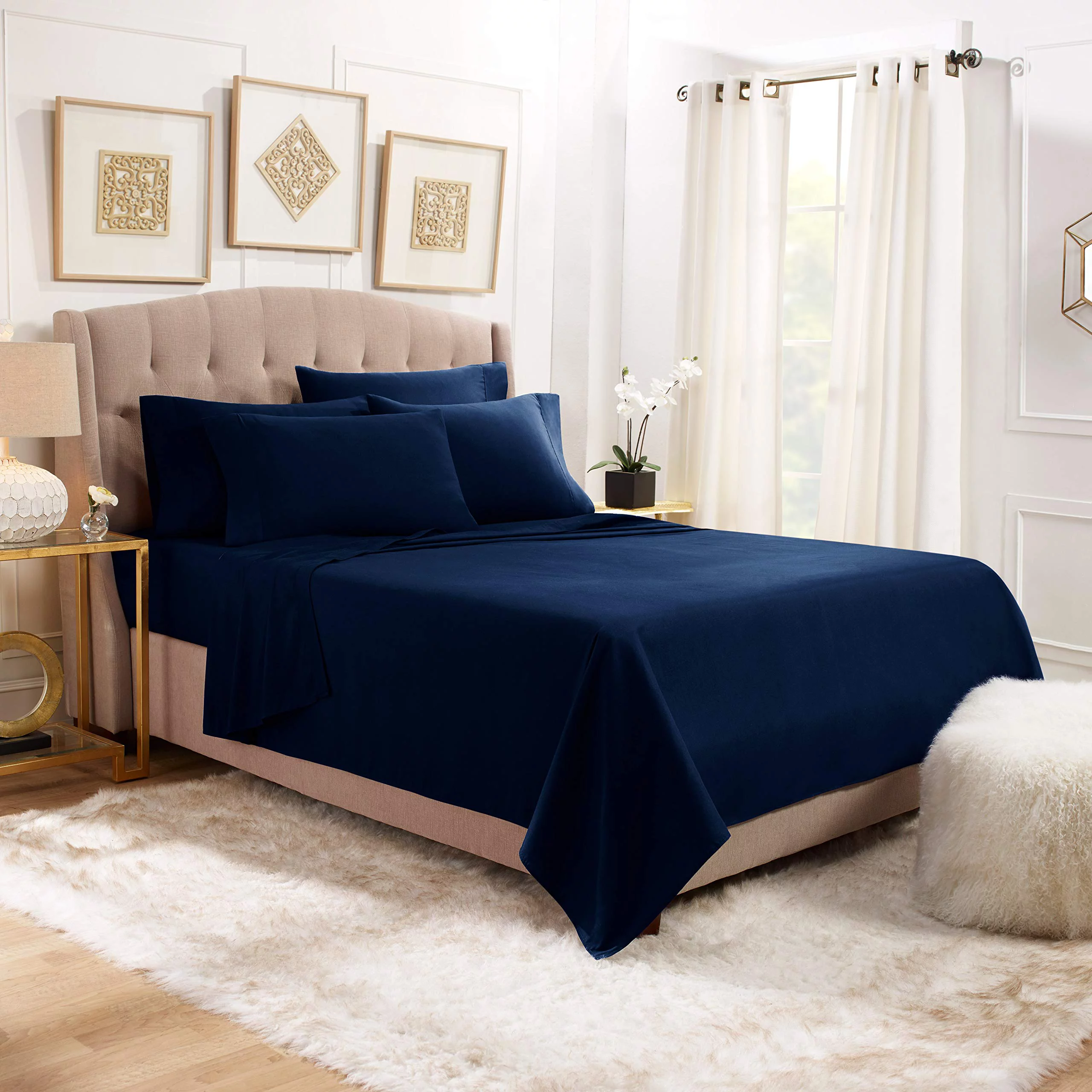
Cotton sheet material is a popular choice for bedding due to its numerous advantages, such as its breathability and affordability, as well as its soft texture.
Pros:
- Breathable: Cotton is a natural fabric that allows air to circulate, keeping you cool and comfortable throughout the night. This is especially beneficial for those who tend to get hot during sleep or live in warm climates.
- Hypoallergenic: Cotton sheets are soft and gentle on the skin, making them a good option for individuals with sensitive skin or allergies.
- Widely Available and Affordable: Cotton bed sheets are one of the most popular bed sheet materials and one of the main reasons for that is that they’re very budget-friendly and widely available in different shapes and colors.
- Easy to Care For Cotton sheets are very easy to maintain as they can be machine-washed and dried.
Cons:
- Can wrinkle easily: One of the main drawbacks is that cotton sheets tend to wrinkle easily. This can be problematic for those who prefer a crisp and neat appearance for their bed linens. However, using an iron or a wrinkle-release spray can quickly and easily fix this problem.
- May not be as durable as some other materials. Even though cotton is a durable material, it’s not as durable as other bed sheet materials that could last for longer, as cotton is known to have a shorter lifespan.
Good for:
- Year-round use: Because cotton is a very breathable and soft-to-touch material, you can use them all year round, as they will be cool during the summer and warm during the cold winter nights.
- Hot Sleepers: If you tend to sleep hot, then cotton is a great choice for you due to its excellent cooling features, as it’s known to be a breathable material that promotes airflow and prevents overheating.
- Allergy Sufferers: Cotton is a hypoallergenic material, which means that it doesn’t retain dust mites or other irritants that could trigger allergic reactions for those who are prone to allergies.
Linen
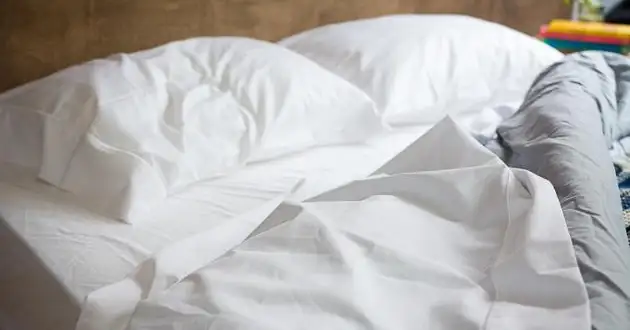
Linen is another material that is commonly used for bed sheets, and they are known for their luxurious feel and hypoallergenic properties, which makes them a great option for anyone looking for all-natural bed sheets.
Pros:
- Highly Breathable and Cool: They are highly breathable and moisture-wicking, making them ideal for hot sleepers, as they will prevent overheating and regulate the bed’s temperature.
- Very Durable: Linen sheets are a great option for people who are looking for a long-lasting bed sheet, as they're known for their excellent durability.
- Naturally Antibacterial and Hypoallergenic: Linen sheets are hypoallergenic and resistant to bacteria and fungi, making them a great choice for those with allergies or sensitive skin.
- Softens with Each Wash: When you first buy a linen bed sheet, you might find it a bit coarse and rough, but with each wash, it will be softer.
Cons:
- More Expensive: Linen sheets can be quite expensive because they’re all natural materials, which could make them not the ideal choice for people who are on a tight budget.
- Wrinkles Easily: Linen sheets are known to get wrinkled very easily; however, some people consider these recurring wrinkles to be part of their aesthetics.
- May Feel Rough at First: Some people might not like the rough texture of linen sheets in the beginning; however, over time and after multiple washes, it will eventually get softer.
Good for:
- Hot Sleepers: People who tend to sleep hot, and looking for cooling bed sheets will find linen to be a great bed sheet material as it regulates the temperature and prevents overheating and sweating.
- People Who Value Durability and Natural Materials: People who like their bedding products to be made from all-natural materials will find linen to be a great option as it’s a hypoallergenic and very durable material.
Flannel
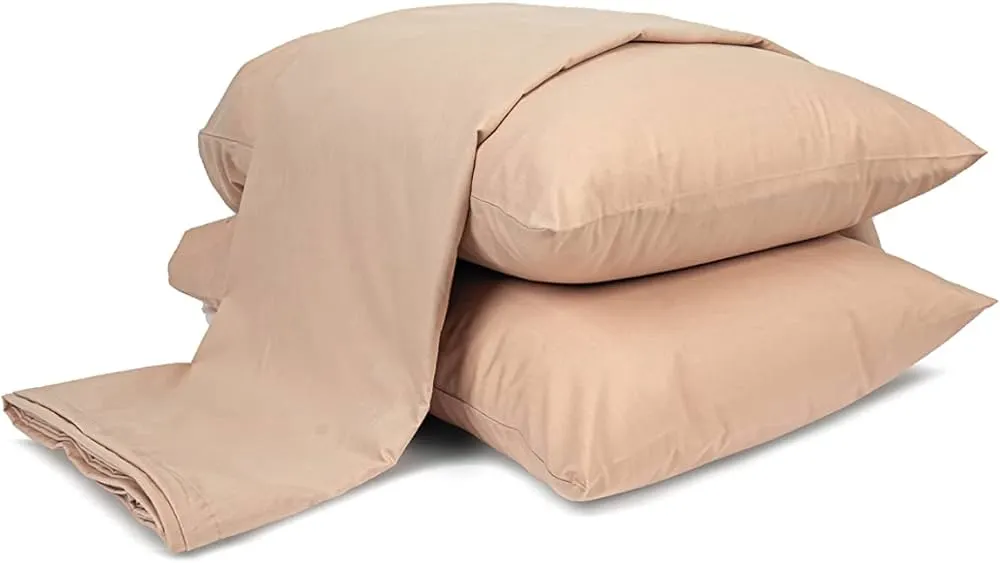
Flannel bed sheets are a popular choice for those seeking warmth and comfort during the colder months. These sheets are made from a soft, brushed cotton fabric that has been napped on both sides. This distinctive texture gives flannel sheets their unique, cozy feel.
Pros:
- Warm and Comfortable: Flannel bed sheets are typically thicker than regular cotton sheets, which makes them ideal for keeping you warm on chilly nights.
- Soft and Cozy Feel: Their soft and plush texture provides a luxurious and comfortable sleeping experience. The brushed cotton fabric feels gentle against the skin.
- Durability: Flannel bed sheets are known for their durability and longevity, as they are designed to withstand repeated washing and maintain their softness over time.
Cons:
- Trap Heat: Due to their thicker and heavier nature, flannel sheets are not one of the best choices if you're looking for cooling bed sheets, as they may not be suitable for warmer climates or individuals who tend to overheat during sleep, as they tend to trap heat.
- Requires Extra Care: Flannel bed sheets may require more frequent washing than regular cotton sheets to maintain their freshness and prevent the buildup of sweat and oils.
Good for:
- Cold Weather: The soft and cozy texture, along with the excellent insulation properties, make them particularly well-suited for colder nights or winter months.
- Those Who Value Warmth and Coziness: Flannel bed sheets are a great choice for those looking to add warmth and comfort to their bedding.
Polyester
Polyester bed sheets are a popular choice for many individuals due to their durability and affordability. These bed sheets are made from a synthetic fabric known as polyester, which is a type of plastic.
Pros:
- Stain-Resistant: Polyester bed sheets are resistant to stains, making them easier to clean and maintain. They can also withstand frequent washing without losing their color or shape.
- Durability: One of the main advantages of polyester bed sheets is their durability. Unlike natural fabrics such as cotton or silk, polyester bed sheets are less likely to tear or wear out over time. This makes them a great investment for those looking for long-lasting bedding options.
- Affordable: Compared to other types of bedding materials, polyester bed sheets are generally more budget-friendly. This makes them a great option for individuals who are looking for a cost-effective way to update their bedroom décor without breaking the bank.
Cons:
- Can Trap Heat: Polyester is not as breathable as natural fabrics like cotton, which means that it may trap heat and moisture, leading to discomfort during warmer months or for individuals who tend to sleep hot.
- Not very soft: Some people may find the texture of polyester bed sheets to be less soft and luxurious compared to natural fabrics.
Good for:
- People who Prioritize Wrinkle-resistance: Polyester is known for its strength and resistance to shrinking, stretching, and wrinkles, making it an ideal material for bed sheets.
- Budget-Conscious Buyers: If you’re on a tight budget and you’re considering buying a bed sheet with multiple advantages without paying way too much, then a polyester bed sheet is one of the best options in the market.
Bamboo
Bamboo has become increasingly popular in the world of bedding over time, and that’s because of how soft to the touch it is, its excellent cooling properties, and its hypoallergenic qualities.
Pros:
- Soft and Comfortable: Bamboo is known to be a very silky and smooth material, which makes it very popular in bedding as many people enjoy its softness.
- Breathable and Moisture-wicking: Bamboo is a breathable material that promotes airflow and regulates temperature, but it also has moisture-wicking properties that prevent any moisture or sweating, which makes bamboo an excellent material for cooling bed sheets.
- Eco-friendly: Some people look for bedding products that are all-natural and eco-friendly, and bamboo fits that description as it’s constructed from all-natural and hypoallergenic materials.
Cons:
- Expensive: Bamboo has many advantages, such as being constructed from all-natural material, besides its breathability and durability, which come with a relatively high price tag.
- May Require Special Care Instructions: Bamboo could be easily damaged if it’s not properly taken care of, so make sure to follow the health guide's instructions.
Good for:
- Hot Sleepers: If you’re a hot sleeper, then you should consider using bamboo sheets, as they have immaculate cooling properties, are very breathable, and include moisture-wicking properties.
- Allergy Sufferers: Bamboo is an excellent choice for people who suffer from allergies, as it’s a hypoallergenic material that doesn’t collect dust or bacteria that could trigger allergies.
- People Who Value Eco-Friendly Materials: People who are looking for an all-natural and eco-friendly material will find bamboo to be a great choice.
Silk
Silk bed sheets are a luxurious and elegant choice for bedding. Made from the natural fibers of the silkworm, these sheets offer a soft and smooth texture that is unmatched by any other fabric.
Pros:
- Luxuriously Soft and Smooth: Silk is known to be one of the most luxurious and soft materials when it comes to bedding, as it offers unmatched smoothness that can enhance the quality of your sleep.
- Excellent Temperature Regulation: Silk bed sheets are breathable and help regulate body temperature, keeping you cool and comfortable throughout the night.
- Naturally hypoallergenic: One of the major advantages of silk bed sheets is their hypoallergenic properties. Silk is naturally resistant to dust mites, mold, and mildew, making it an excellent choice for individuals with allergies or asthma.
Cons:
- Very Expensive: Silk bed sheets can be quite expensive compared to other bedding materials, such as cotton or polyester. This is due to the labor-intensive process involved in harvesting and producing silk.
- Requires Delicate Care: One of the drawbacks of silk bed sheets is their delicate nature. While silk is a strong fiber, it can be easily snagged or damaged if not handled with care.
Good for:
- Those Seeking Ultimate Luxury: People who are looking for the highest degrees of luxury when it comes to bed sheets should look no further than silk bed sheets, as they’re considered to be the most luxurious bedding material on the market.
- Allergy Sufferers: As silk bed sheets are naturally hypoallergenic, this makes them resistant to irritants such as dust mites that could trigger an allergy.
- Hot Sleepers: The delicate and lightweight nature of silk bed sheets makes them perfect for warmer climates, as they're great cooling bed sheets for those who tend to sleep hot.
Microfiber
Microfiber bed sheets are a popular choice for many due to their soft and smooth texture. The microfiber material is made from ultra-fine synthetic fibers that are tightly woven together, creating a fabric that is lightweight, durable, and resistant to wrinkles.
Pros:
- Wrinkle-resistant: Because the fabric of microfibers is tightly woven together, it is considered a wrinkle-free material that will hold its shape even after multiple uses and will help you maintain the aesthetics of your room.
- Easy to Care For: Microfiber bed sheets are easy to care for as they are machine washable and quick-drying
- Affordable: Microfiber is a synthetic material, which makes it more budget-friendly than other natural materials such as linen or bamboo while still providing many great advantages that enhance the quality of your sleep.
- Hypoallergenic: Microfiber bed sheets are hypoallergenic, making them a great option for those with allergies or sensitive skin.
Cons:
- May Feel Slightly Plastic-y: Some people may find them too slippery and plasticy, which can make it difficult to keep the sheets in place on the bed.
- Can Trap Heat: Microfiber sheets may not be as breathable as natural fibers like cotton, which could be a concern for those who tend to sleep hot.
Good for:
- Cold Weather: If you live in cold weather, microfiber will provide a cozy and warm feeling that will enhance the quality of your sleep and give you a better sleeping experience.
- People Who Prioritize Quick and Easy Maintenance: Some people don’t want to invest a long amount of time in maintaining their bedsheets, and microfiber bed sheets are a great option for these people as they can be machine washed and they have quick drying features.
- Quality budget-conscious buyers: Microfiber bed sheets tend to be on the cheaper side when it comes to bedsheets; however, that doesn’t mean that they provide fewer advantages than a pricey option, which makes them a great choice for people on a budget.
Tencel
Tencel is a type of fabric that is made from the cellulose found in wood pulp, usually sourced from sustainably managed eucalyptus trees. This natural material gives Tencel bed sheets a soft and luxurious feel, similar to silk or satin, making them highly desirable for bedding.
Pros:
- Soft and Comfortable: Tencel is a very soft-to-touch and smooth material that provides an unmatched comfort feel that helps you get better sleep.
- Breathable: Tencel is one of the best cooling bed sheets as it's a very breathable material that promotes airflow and regulates temperature, which prevents overheating or sweating during the night.
- Moisture-wicking: Tencel has excellent moisture-wicking properties, meaning it can effectively absorb and release moisture, keeping you cool and dry throughout the night.
- Hypoallergenic: Tencel is hypoallergenic and resistant to bacteria, making it a great choice for individuals with allergies or sensitive skin.
Cons:
- Expensive: Tencel tends to be more expensive compared to other types of bedding materials. This is due to the manufacturing process and the use of high-quality fibers.
- Wrinkles easily: Tencel bed sheets may wrinkle more easily than cotton or polyester sheets, requiring more frequent ironing or steaming to maintain a smooth appearance.
- Special Care: Tencel requires special care and maintenance so it won’t get damaged during the cleaning process, so make sure to follow the manufacturer’s instructions before cleaning your Tencel sheets.
Good for:
- Hot Sleepers: Tencel is one of the best cooling bed sheets because of its excellent cooling performance, From its breathability to its moisture-wicking properties, Tencel will drastically enhance the quality of your sleep.
- Allergy Sufferers: Tencel is a hypoallergenic material, which means that it doesn’t retain any irritants that could trigger any allergy symptoms for people who suffer from allergies.
Bed Sheet Weaves and Knits
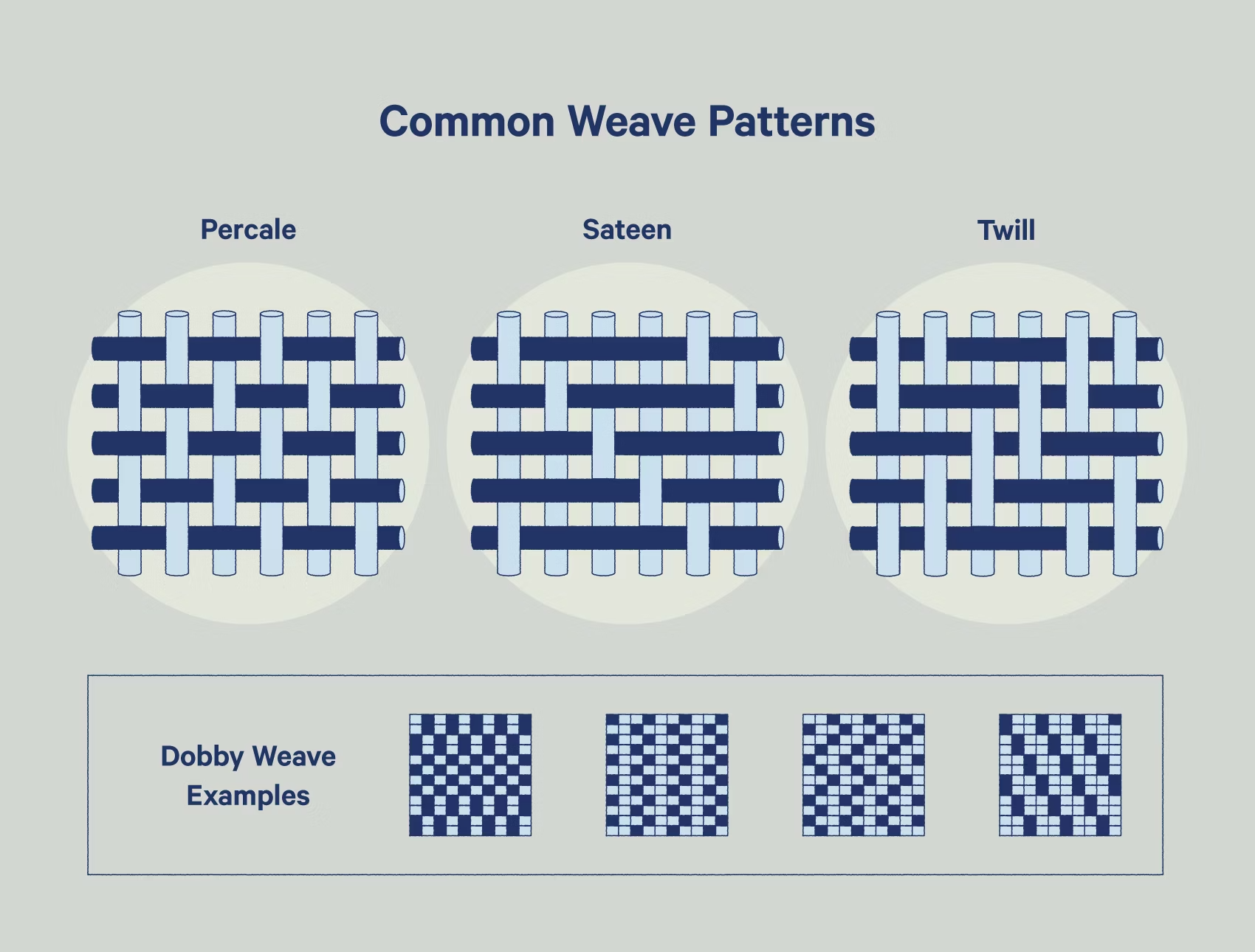
Percale
Percale is a tightly woven fabric characterized by its smooth and crisp feel. It is often used for bed sheets and other bedding items due to its durability and breathability.
Sateen
Sateen weave has a lustrous and silky appearance thanks to the satin weave used in its construction. This makes it a popular choice for luxury bedding.
Twill
Twill weave creates a diagonal pattern on the fabric, giving it a unique texture and visual appeal.
Flannel
Flannel is a soft and warm fabric that is made from either wool or cotton fibers. It is known for its brushed surface, which gives it a fuzzy texture that is perfect for cozy winter bedding.
Jersey
Jersey sheets are not as common as other types of weaves and knits and that’s because they’re knitted, not woven; however, they are also not as durable as other weaves.
Choosing the Right Bed Sheet Material
Material
Your bed sheet material is the most vital aspect to consider when you’re choosing a bed sheet, as you need to make sure that it matches your sleeping preference and style, is easy to maintain, and doesn’t trigger any allergic reactions.
Size
Make sure to consider the size of your bed sheet before choosing the right one for you, as you need to ensure that it matches your bed sheet and your base or platform, for example, if you have a queen size bed make sure that your sheets are also queen bed sheets, or if your bed is king size, you'll need a king bed sheets.
Color and pattern
This is purely a matter of personal preference and can greatly impact the overall aesthetic of the bedroom. Some people prefer neutral shades and simple designs, while others may opt for bold and vibrant colors or intricate patterns. Ultimately, the choice of color and pattern should reflect the individual's style and complement the existing decor.
Thread Count
Thread count refers to the number of threads per square inch of fabric and is often used as an indicator of quality. A higher thread count generally indicates a softer and more luxurious feel. However, it's important to note that thread count alone does not determine the overall quality of the sheets. Factors such as the type of fabric used and the weaving technique also play a significant role in determining comfort and durability.
Cooling
Some bed sheet materials tend to trap heat, which doesn’t provide the most comfortable sleeping experience, especially for hot sleepers, so you need to make sure that your bed sheets are cooling bed sheets that are made from a breathable material that promotes airflow and prevents overheating.
Maintenance
Not all bed sheet materials are equal when it comes to cleaning and maintaining them, as some are easier to clean than others that need special care and a specific routine to be cleaned. This could be an issue for some people who are short on time or not equipped to clean them.
Price
Price is a very significant factor when it comes to buying a bed. If you’re on a tight budget, you need to do your research and make sure that you’re getting the best bed sheet for you that fits all your sleeping preferences while still being within your budget.
Personal Preferences
At the end of the day, it all boils down to your personal preference, so make sure you’re getting the most comfortable material for you that accommodates your body and suits your sleeping position.
FAQs
What are the best materials for bed sheets for hot sleepers?
There are many cooling bed sheets and materials for bed sheets that regulate the temperature and prevent overheating, most notably Tencel, which is considered to be one of the best bedding sheets because it's a hypoallergenic material that has moisture-wicking properties and it's one of the best cooling sheets, which makes it a great choice for hot sleepers.
What are the best luxury bed sheets?
Silk bed sheets are considered to be one of the most luxurious bed sheets, especially silk king bed sheets. They're ultra-soft to the touch and easy on the skin, and they are also one of the best cooling sheets, which is why silk is always associated with luxury bedding. However, they're also known to be quite expensive compared to other materials.
Does weave type matter?
Yes, weave plays a crucial factor when it comes to bed sheets, as the weave type directly affects the softness of the sheets as well as their breathability. The weave type also dictates the durability and lifespan of the bed sheet.
What’s the best thread count for sheets?
The recommended thread count is between 200 and 400; otherwise, the sheets could have a rough texture if they're under 200 threads, and if they're more than 400, the sheet will be heavier and harder to handle.
Conclusion
When it comes to choosing from the different types of sheets and pillowcases, it is important to consider the materials and their qualities.
By considering factors such as comfort, durability, care requirements, and any specific sensitivities or allergies, one can make an informed decision on which bed sheet material is best suited for their individual sleep needs.
Jessica H.
Jessica is a reviewer, writer, and sleep enthusiast at Sleepiverse. Jessica graduated with her master's degree in Nursing research and education. She is a registered nurse and currently works in the Intensive Care Unit. Since becoming a nurse, Jessica has worked the night shift, which means a disrupted sleep schedule. Knowing she needed to function at her best while caring for patients at night, she spent a lot of time researching how to sleep well with a difficult schedule.


